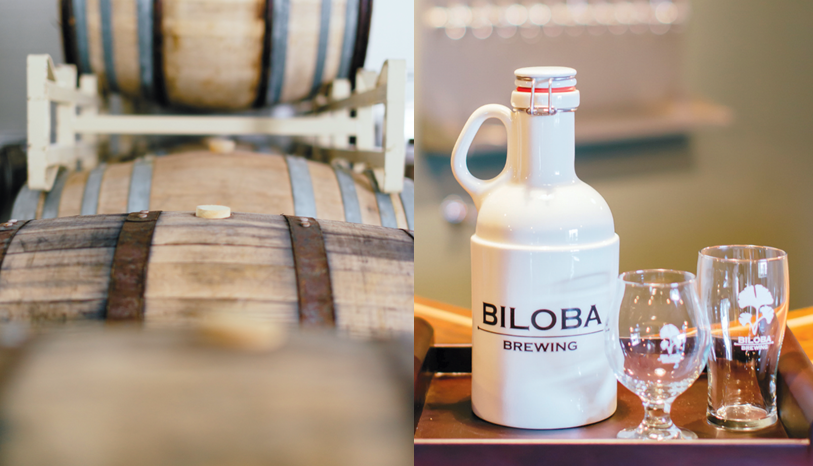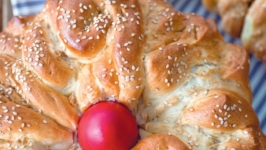Brewing as a Family and Community Business
There’s an old saying: “Give the people what they want.” Milwaukee and its surrounding neighborhoods want beer, and lots of it—an unquenchable thirst that has lasted ages and branded our city. But a recent surge in demand for microbrews has spurred several local entrepreneurs to launch small-scale breweries, pouring out fresh suds made with local ingredients.
Biloba Brewing Company in Brookfield, set to open this spring, has been a long-time dream for a pair of passionate brewers. Husband-wife team Gordon and Jean Lane owns the 2,000 square-foot tasting room and microbrewery, and their children, Kathryn (31), Kevin (29) and Kristen (24) also pitch in. Kathryn and Kristen will work in the tasting room and handle social media and marketing, while Kristen is learning how to brew. Kevin, a former pilot plant brewer for MillerCoors, also helps with production part time. Jean calls herself the ideas person and will focus on tastings, tours and more.
Gordon and Jean have lived in Brookfield for 24 years, and both previously lived nearby for 20-plus years. Aside from having a short commute to work, they wanted to offer the community they care so much about a unique place where people can get to know their neighbors. Add to that, the city of Brookfield was very supportive, providing a loan and establishing the Brookfield Village Limited, a nonprofit business association, to help revitalize the village area around Biloba. So with Gordon’s extensive experience in the industry and Jean’s creativity, the investment was a no-brainer.
“People have always enjoyed our fresh beer that we bring to parties, so we thought why not do it on a bigger scale?” confessed Jean.
Not only has Gordon been homebrewing since the late ‘70’s, but he also serves as the president and chief operating officer of Briess Malt & Ingredients Co. in Chilton, a leading global provider of malts for brewing.
Gordon’s passion for brewing stems in part from his degree in food science. ”The whole (brewing) process allows you to be creative with different malts, yeasts, hops, temperatures, and even wood barrels for aging,” said Gordon. Jean chimed in: “I also find the food pairings… and desire for more flavorful beers continues to drive my passion.”
The family chose the name Biloba in reference to the Ginkgo biloba tree, which has erratic branches and deep roots, reflecting the brewery’s aim to create unique craft beers and establish a strong bond with the community.
Biloba will focus on small-batch German- and Belgian-style beers, using their 1BBL (Barrels of Beer – or 46 gallons) in-house brewing system. Their 5 BBL fermenting kettles hold 155 gallons. Seasonal specialty ales will age in pinot, burgundy, and bourbon barrels. The unique blends will be available only in the tasting room, for purchase through growler sales, and hopefully soon, on tap at local restaurants.
The plan is to have 10 different beers on tap like a Rye IPA, Door County Cherry, Imperial Stout, Mapils, Belgian Wit, Golden Ale, Smoked Porter and the Brookfield 1836 Beer, developed by Doug Romfoe, winner of Biloba’s home brewing contest last fall. The contest was one of Jean’s first ideas to involve the community, support home brewers and honor Brookfield’s history, which became part of Milwaukee in 1836. The Lanes provided free ingredients to 32 participants and an independent panel of seasoned testers selected Romfoe’s recipe.
Biloba’s malt supplier, Briess, is also a family-owned business that has an extraordinary history, dating back to 1876. It is one of the last living specialty malts providers in the world. Malt is a major player in the brewing process. It’s the basic ingredient that helps gives your brew its unique flavor, color and body and provides the complex carbohydrates and sugars that are needed for fermentation. Aside from using specialty malts from Briess, the Lane family also owns a 46-acre farm in Kiel, Wisconsin where they grow their own hops and barley, harvest maple syrup, and host bee hives to gather honey for use in brewing.
Gordon and Jean have made every effort to ensure that all the furnishing and fixtures in the tasting room are repurposed. Gordon estimates 95 percent of their waste material from brewing is recyclable, from the water they use in brewing to the used grain that goes to a farm for cattle feed.
Biloba’s launch comes on the heels of an explosion in craft beer, with US sales in the category nearly doubling between 2007-2012, to $12 billion, according to Mintel, an independent research firm. They are forecasting the segment will grow to $18 billion by 2017.
“People start this as a hobby and see the success people are having, so they start thinking, ‘If they can do it, why can’t we?’” rationalized Doug MacKenzie, head distiller at Great Lakes Distillery.
MacKenzie sees it as an extension of the local foodie movement. “Briess and even some of the smaller providers are offering such a large selection of quality ingredients and in small quantities; it levels the playing field a bit between micro- and macro-brewers.”
The Lanes are already planning for the next phase in Biloba’s evolution, in production and marketing. “Within the year, we will put out limited-release bottles and eventually work with a fellow Wisconsin brewery in order to produce our primary beers using a larger brewing system we will distribute into retail outlets,” said Gordon.
“Social media has been great to us, we haven’t had to advertise at all and we’ve had people come to us,” said Jean. “We’ve been contacted by area businesses to use the tasting room for meetings and we’ve even talked about brewing a specialty batch for a bride and groom, complete with custom labels.”
Jean has no shortage of ideas, and Gordon no shortage of experience. Through events, clubs and classes, they are hoping to build community and camaraderie through craft brewing. Together as a family, the Lanes are looking towards a big future for Biloba.
Area Microbreweries Opened in 2013/Early 2014
Big Head Brewing Co. (6204 W. State St., Wauwatosa)
What makes it special: Offers diabetic-friendly beer.
4 Brothers Blended Beer (W220 N1531 Jericho Ct, Waukesha – office and warehouse)
What makes it special: Creates blended recipes using different styles of beer that are brewed in large batches at Sand Creek Brewery in Black River Falls.
District 14 Brewery and Pub (2273 S. Howell Ave., Bay View)
What makes it special: Brews a double IPA with water from Bay View’s artisan well. A portion of proceeds from the sale of that beer will go to the Bay View Historical Society, which maintains the well.
Brenner Brewing Co. (706 S. Fifth St.,Walker’s Point)
What makes it special: A production brewery with an art studio next door. The bottle labels will also be created by local artists.
How the Craft Brewing Industry Stacks Up
• Growth of the craft brewing industry in 2012 was 15% by volume and 17% by dollars as compared to 13% and 15% in 2011.
• Craft brewers sold an estimated 13,235,917 barrels of beer in 2012, up from 11,467,337 in 2011.
• Craft brewing sales share (of overall beer sales) in 2012 was 6.5% by volume and 10.2% by dollars.
• Craft brewer retail dollar value in 2012 was an estimated $11.9 billion.
• 2,347 craft breweries operated for some or all of 2012, (including brewpubs, microbreweries and regional craft breweries).
• Craft brewers currently provide an estimated 108,440 jobs in the U.S., including serving staff in brewpubs.
Source: Brewer’s Association, 2013






